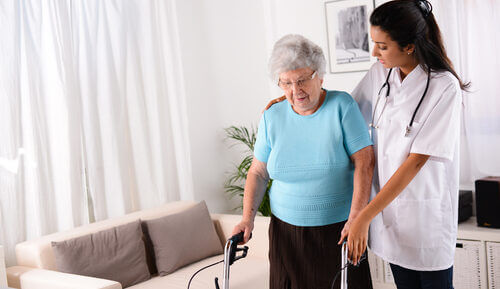
Page contents
Going off to university or college is a fresh new chapter and supporting elderly, disabled or vulnerable people can be the last thing on a student’s mind. However, a lot of students have part-time jobs alongside their studies and working in care is an option.
Katie Belham, 26, worked as a support worker and home carer while she was an undergraduate. While most of her friends had part-time jobs alongside their studies, she was the only one she knew of who was working in the care sector.
Ms Belham explains: “I worked in home care and support throughout my time at university. I never planned it, I was browsing part-time jobs one day and one for a support worker came up and I thought ‘I could do that’.”
Some students even live with older or vulnerable people, providing companionship and help around the home in exchange for free boarding.
Will work in care fit around my studies?
Many students successfully juggle part-time work with full-time education and student socials. Care work is no different.
Ms Belham says: “Working in care as student was really flexible. My employers were very understanding that I was fitting it around my studies, so didn’t demand more hours of me than I had time for.
“Each term when I got my new university timetable, I’d tell them the days and times I could realistically work and they’d plan my hours around that. I’d then have that schedule for that whole term, rather than the rota changing every week, so I could still plan studying and my social life around it easily. I didn’t have a car so they’d match me to people whose homes I could easily walk or cycle to.
“Sometimes if a colleague was ill or on holiday they’d ask if I could cover, but if I couldn’t I wasn’t penalised for it.”
What kind of care jobs are there?
Ms Belham found that care wasn’t a job that students often considered. She says: “All my friends were working in shops and bars. People didn’t seem to really know about care. Most would be impressed, like I was a nun or something, and say, “Wow, I could never do that,”; a few would sneer and say, “Don’t you just wipe bums all day?”. There’s a lack of understanding, certainly in people my age, about what care work involves.
“I can see why they’d be nervous of it, but the fear goes once you meet your clients. I built good relationships with the people I cared for – I really did care about them. Some were disabled and some were elderly, some were funny and cheerful, some had lived incredible lives and had great stories.
“One elderly lady just wanted you to have a chat and help her to make jam sandwiches every day, she had a wicked sense of humour. One man was completely blind and one of the most positive people I’ve come across.
“Some clients weren’t so cheerful, a couple were quite down about not being fully independent anymore, but they were still lovely, I’d try to be soothing and boost their confidence. I met two people who were paralysed but so sharp mentally, both only in their forties. You get to know clients’ families too and learn so much about people. The people make the job.
“The work was varied – yes, you have unpleasant clean ups occasionally but that’s a tiny fraction of the job, you still have to clean up bodily fluids if you work in a bar. I would do cooking, baking, taking them out shopping, to the cinema, to tourist attractions. I helped people to shower, eat and even smoke. There was a lot of housework to do too but that was actually an ideal break from studying all week, it was a chance to do something physical and to clear my head.”
Some part-time positions that can suit students include:
Care assistant in a care home
Care assistants work in a care home, usually for older people. The residents may be frail or have illnesses such as dementia. You’ll support them with daily life.
Home carer
Home carers, or domiciliary carers, deliver support to people in their own homes. It’s useful to have a car to travel between calls (though not always essential) and your mileage is paid for by the company.
Support worker
Support workers support people with learning disabilities or sometimes physical disabilities who live in supported living accommodation. They can also support people living with mental health conditions or substance misuse.
Community support workers support people with similar needs, but in their own homes rather than supported living accommodation.
Personal assistant
A personal assistant supports people with learning or physical disabilities who live in their own home, rather than supported or shared living. You’ll usually work with one family and are employed by them, rather than a support provider.
Find out more about the role of a personal assistant.
Activities coordinator
An activities coordinator plans and delivers an activities programme for residents in a care home or nursing home.
Find more information about roles in the care sector.
What skills do I need to work in care?
Entry-level jobs in care often only require that you are compassionate, friendly and have a keen interest in helping people.
Many home care providers require employees to have a valid driving licence and a car, however this is not always the case, particularly in cities where universities are anyway. Here you can walk, cycle or use public transport to get to calls. Alternatively, you could work in a care home or supported living facility.
You’ll need to have a DBS check and some training before you start. This is just a background check to make sure you don’t have a criminal record and are safe to work with vulnerable people. The DBS check is paid for by the company and training is usually paid by the hour just as work is.
Ms Belham advises students to give care a go, as, “all sorts of skills, experience and personalities” are valuable.
She advises: “You don’t usually need prior experience to get a job in care, that’s handy for a student, you just need kindness, common sense, a good attitude and work ethic. You need to be good with people, empathetic, but you don’t have to be an extrovert, some of the best carers I met were shy and sweet.”
Isn’t care work a big responsibility?
Ms Belham emphasises that care work is a responsibility, but good care providers support their staff.
She explains: “One of my favourite things about home care was that I was trusted to get on with my work and to use my own initiative. I don’t know if it’s the same in care homes. Obviously there’s the care plan and we recorded everything we did so my employers and the other carers would know what had been done and anything about the client that the next carer needed to know for their shift, but we weren’t micromanaged.
“They had a 24-hour on-call line that we could phone if we were unsure about something or if there was an emergency, so there was always support if we needed it.
“One thing I noticed about my job compared to my peers was that you have to be that bit more responsible. You can’t go out and get wrecked the night before an early shift then call in sick at the last minute, because someone has to do that shift.
“The person you care for is relying on you and you have to prioritise their needs on the days you work, also to respect your colleagues who’d give up their days off to cover for you or catch up on work you didn’t do. I’ve seen a couple of people who didn’t get that and who’d call in sick all the time, do the bare minimum or be a bad team player; those people didn’t last long.
“If you’re good-natured and want to make a positive difference to people’s lives, it’s a really fun and rewarding thing to do. Even though there are some hard days, every shift you do is worthwhile and you go home knowing you’ve done a little bit of good in the world.”
How do I find work in the care sector?
You can search for jobs in your area, including specifically your preferred role:
To search for jobs in home care.
To search for jobs in care homes.


